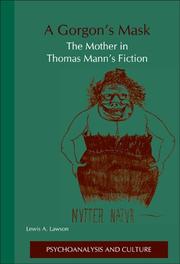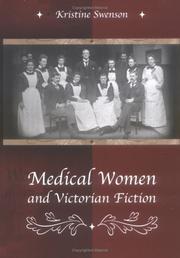| Listing 1 - 10 of 81 | << page >> |
Sort by
|
Periodical
Year: 2007 Publisher: South Wales, UK : University of Glamorgan Research Centre for Literature, Arts and Science,
Abstract | Keywords | Export | Availability | Bookmark
 Loading...
Loading...Choose an application
- Reference Manager
- EndNote
- RefWorks (Direct export to RefWorks)
Book
ISBN: 3825378152 9783825378158 3825369064 9783825369064 Year: 2018 Publisher: Heidelberg, Germany : Universitätsverlag Winter,
Abstract | Keywords | Export | Availability | Bookmark
 Loading...
Loading...Choose an application
- Reference Manager
- EndNote
- RefWorks (Direct export to RefWorks)
Medicine In literature. --- Autobiography. --- Autobiographies --- Autobiography --- Egodocuments --- Memoirs --- Biography as a literary form --- Medical care in literature --- History and criticism --- Technique --- 2000-2099 --- Medicine in literature.
Book
ISBN: 0988986523 Year: 2013 Publisher: San Francisco, CA : University of California Medical Humanities Press,
Abstract | Keywords | Export | Availability | Bookmark
 Loading...
Loading...Choose an application
- Reference Manager
- EndNote
- RefWorks (Direct export to RefWorks)
Medicine in literature. --- Fiction. --- Bioethics. --- Bioethique. --- Roman --- Medecine dans la litterature. --- Bioethical Issues --- Medicine in Literature --- Fiction --- Histoire et critique. --- History and criticism. --- 1800-1999
Book
ISBN: 1438481691 Year: 2021 Publisher: Albany, New York State : State University of New York Press,
Abstract | Keywords | Export | Availability | Bookmark
 Loading...
Loading...Choose an application
- Reference Manager
- EndNote
- RefWorks (Direct export to RefWorks)
Examines how literature mediated a convergence of militarism and medicine in Victorian culture that continues into the present via a widespread martial metaphor. Medicine is most often understood through the metaphor of war. We encounter phrases such as "the war against the coronavirus," "the front lines of the Ebola crisis," "a new weapon against antibiotic resistance," or "the immune system fights cancer" without considering their assumptions, implications, and history. But there is nothing natural about this language. It does not have to be, nor has it always been, the way to understand the relationship between humans and disease. Medicine Is War shows how this "martial metaphor" was popularized throughout the nineteenth century. Drawing on the works of Mary Shelley, Charles Kingsley, Bram Stoker, Arthur Conan Doyle, and Joseph Conrad, Lorenzo Servitje examines how literary form reflected, reinforced, and critiqued the convergence of militarism and medicine in Victorian culture. He considers how, in migrating from military medicine to the civilian sphere, this metaphor responded to the developments and dangers of modernity: urbanization, industrialization, government intervention, imperial contact, crime, changing gender relations, and the relationship between the one and the many. While cultural and literary scholars have attributed the metaphor to late nineteenth-century germ theory or immunology, this book offers a new, more expansive history stretching from the metaphor's roots in early nineteenth-century militarism to its consolidation during the rise of early twentieth-century pharmacology. In so doing, Servitje establishes literature's pivotal role in shaping what war has made thinkable and actionable under medicine's increasing jurisdiction in our lives. Medicine Is War reveals how, in our own moment, the metaphor remains conducive to harming as much as healing, to control as much as empowerment. Lorenzo Servitje is Assistant Professor of Literature and Medicine at Lehigh University. He has published several books, including Syphilis and Subjectivity: From the Victorians to the Present (coedited with Kari Nixon); Endemic: Essays in Contagion Theory (coedited with Kari Nixon); and The Walking Med: Zombies and the Medical Image (coedited with Sherryl Vint).
English fiction --- Medicine in literature. --- Diseases in literature. --- History and criticism
Book
ISBN: 1474448771 1399513478 1474489354 1474448763 1474448747 1474448755 Year: 2022 Publisher: Edinburgh : Edinburgh University Press,
Abstract | Keywords | Export | Availability | Bookmark
 Loading...
Loading...Choose an application
- Reference Manager
- EndNote
- RefWorks (Direct export to RefWorks)
The Retrospective Raj: Medicine, Literature & History After Empire undertakes a detailed analysis of the use of medicine as a recurrent and defining trope of post-imperial fiction published between 1950 and 1990. The book argues that during this crucial period of recent history, when the influence and prestige of the British Empire was nearing its end, a range of contemporary novelists including J.G. Farrell, Paul Scott, John Masters, Ruth Prawer Jhabvala, and Salman Rushdie identified and used medicine as a discursive paradigm through which to engage critically with the history, authority and legacy of the British Empire within their writing.
Medicine in literature. --- English fiction --- Postcolonialism in literature. --- Imperialism in literature. --- History and criticism.
Book
ISBN: 1317035410 1317035402 1282295179 9786612295171 0754696405 9780754696407 0754668029 9780754668022 9781282295179 9780754668022 9781317035411 9781317035404 6612295171 9781315615646 9781317035398 9781138275409 1315615649 1138275409 Year: 2009 Publisher: Farnham, England Burlington, VT Ashgate
Abstract | Keywords | Export | Availability | Bookmark
 Loading...
Loading...Choose an application
- Reference Manager
- EndNote
- RefWorks (Direct export to RefWorks)
Following the decline of the marriage plot in Victorian novels by a range of novelists, including Harriet Martineau, George Eliot, Elizabeth Gaskell, George MacDonald, and Bram Stoker, Tabitha Sparks argues that a narrative's stance towards scientific reason is revealed in the figure of the doctor. Novels with romantic doctors deny the authority of empiricism, while those with clinically minded doctors uphold the determining logic of science and threaten the novel's romantic plot.
English fiction --- Physicians in literature. --- Medicine in literature. --- Marriage in literature. --- Medical care in literature --- History and criticism.
Book
ISBN: 3031411412 3031411404 Year: 2023 Publisher: Cham, Switzerland : Palgrave Macmillan,
Abstract | Keywords | Export | Availability | Bookmark
 Loading...
Loading...Choose an application
- Reference Manager
- EndNote
- RefWorks (Direct export to RefWorks)
Science, Medicine, and Aristocratic Lineage in Victorian Popular Fiction explores the dialogue between popular literature and medical and scientific discourse in terms of how they represent the highly visible an pathologized British aristocratic body. This books explores and complicates the two major portrayals of aristocrats in nineteenth-century literature: that of the medicalised, frail, debauched, and diseased aristocrat, and that of the heroic, active, beautiful ‘noble’, both of which are frequent and resonant in popular fiction of the long nineteenth century. Abigail Boucher argues that the concept of class in the long nineteenth century implicitly includes notions of blood, lineage, and bodily ‘correctness’, and that ‘class’ was therefore frequently portrayed as an empirical, scientific, and medical certainty. Due to their elevated and highly visual social positions, both historical and fictional aristocrats were frequently pathologized in the public mind and watched for signs of physical excellence or deviance. Using popular fiction, Boucher establishes patterns across decades, genres, and demographics and considers how these patterns react to, normalise, or feed into the advent of new scientific and medical understandings.
Book

ISBN: 2913322433 284867685X 9782913322431 Year: 2019 Volume: 685 90 Publisher: Besançon : Presses universitaires de Franche-Comté,
Abstract | Keywords | Export | Availability | Bookmark
 Loading...
Loading...Choose an application
- Reference Manager
- EndNote
- RefWorks (Direct export to RefWorks)
Le personnage du médecin, le rapport du patient avec un corps souffrant suscitent un intérêt privilégié dans le domaine littéraire. Certains auteurs étudiés dans le cadre d’un séminaire de DEA ont eux-mêmes pratiqué la médecine ou ont été témoins d’un père qui la pratiquait. D’autres ont observé sur eux les progrès d’une maladie. Le regard de l’écrivain a pu être marqué par la sympathie ou par une distance entraînant une peinture caricaturale. Des fictions romanesques ou dramatiques, des essais, des écrits autobiographiques gardent la trace d’un tel intérêt. Les études portent sur la littérature française, espagnole, anglaise, allemande. Les auteurs des communications sont en général spécialistes de littérature. Des médecins ont aussi apporté leur collaboration.
Literature and medicine --- Medicine in literature. --- History & Philosophy Of Science --- Literary Theory & Criticism --- médecine --- littérature --- séminaire --- médecin --- corps --- maladie --- caricature --- fiction

ISBN: 9042017457 940120182X 1417591196 9781417591190 9789401201827 9789042017450 Year: 2005 Publisher: Amsterdam Rodopi
Abstract | Keywords | Export | Availability | Bookmark
 Loading...
Loading...Choose an application
- Reference Manager
- EndNote
- RefWorks (Direct export to RefWorks)
The thesis of A Gorgon's mask: The Mother in Thomas Mann's Fiction depends upon three psychoanalytic concepts: Freud's early work on the relationship between the infant and its mother and on the psychology of artistic creation, Annie Reich's analysis of the grotesque-comic sublimation, and Edmund Bergler's analysis of writer's block. Mann's crisis of sexual anxiety in late adolescence is presented as the defining moment for his entire artistic life. In the throes of that crisis he included a sketch of a female as Gorgon in a book that would not escape his mother's notice. But to defend himself from being overcome by the Gorgon-mother's stare he employed the grotesque-comic sublimation, hiding the mother figure behind fictional characters physically attractive but psychologically repellent, all the while couching his fiction in an ironic tone that evoked humor, however lacking in humor the subtext might be. In this manner he could deny to himself that the mother figure always lurked in his work, and by that denial deny that he was a victim of oral regression. For, as Edmund Bergler argues, the creative writer who acknowledges his oral dependency will inevitably succumb to writer's block. Mann's late work reveals that his defense against the Gorgon is crumbling. In Doctor Faustus Mann portrays Adrian Leverkühn as, ultimately, the victim of oral regression; but the fact that Mann was able to compete the novel, despite severe physical illness and psychological distress, demonstrates that he himself was still holding writer's block at bay. In Confessions of Felix Krull: Confidence Man, a narrative that he had abandoned forty years before, Mann was finally forced to acknowledge that he was depleted of creative vitality, but not of his capacity for irony, brilliantly couching the victorious return of the repressed in ambiguity. This study will be of interest to general readers who enjoy Mann's narrative art, to students of Mann's work, especially its psychological and mythological aspects, and to students of the psychology of artistic creativity.
Psychological study of literature --- Mann, Thomas --- Medicine in Literature. --- Mothers in literature. --- Mothers --- Medical care in literature --- psychology. --- Grotesque in literature. --- Mann, Thomas, --- Criticism and interpretation. --- Psychology.

ISBN: 082626431X 9780826264312 0826215661 9780826215666 Year: 2005 Publisher: Columbia University of Missouri Press
Abstract | Keywords | Export | Availability | Bookmark
 Loading...
Loading...Choose an application
- Reference Manager
- EndNote
- RefWorks (Direct export to RefWorks)
English fiction --- Literature and medicine --- Medicine in literature. --- Physicians in literature. --- Women and literature --- Women physicians in literature. --- Medical care in literature --- History and criticism. --- History
| Listing 1 - 10 of 81 | << page >> |
Sort by
|

 Search
Search Feedback
Feedback About UniCat
About UniCat  Help
Help News
News